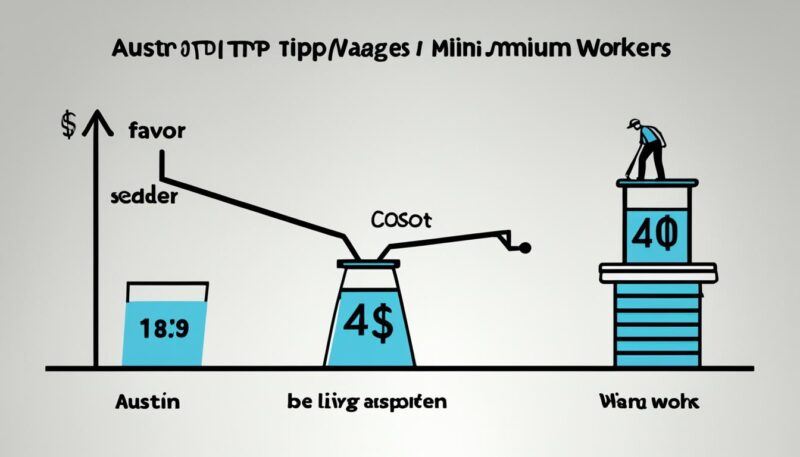As the calender pages turn towards 2024, the city known for its vibrant culture and booming tech industry, Austin, braces itself for pivotal changes in its economic policy. The discourse around the Austin Minimum Wage has intensified, with the upcoming year poised to herald a significant transition in the way workers are compensated. This move isn’t merely a response to the escalating demands of the cost of living but is also deeply ingrained in the ongoing struggle for income equality in Texas. As debates unfold and legislations take shape, the implications for Austin’s economic landscape seem as extensive as they are profound.
Within Texas, a state traditionally aligned with the federal baseline, the shift to increase the minimum wage stands as a testament to Austin’s progressive stance on economic matters. The minimum wage in Texas has long sparked discussions, and Austin’s proactive approach has raised expectations of a ripple effect that may redefine income dynamics across the state. The proposed wage adjustments for 2024 aim to not just uplift the workforce, but also, to initiate a larger conversation about the essence of a fair and equitable economy.
The upcoming policy changes in Austin’s minimum wage structure serve as a beacon of hope for many, signaling the city’s dedicated effort to address disparities and promote a sustainable standard of living. As stakeholders from varied sectors – from labor activists to business leaders – chime in with their perspectives, Austin finds itself at the cusp of a critical juncture in forging an economic policy that upholds the dignity of its labor force while maintaining its entrepreneurial spirit.
Key Takeaways
- The anticipated adjustment in Austin Minimum Wage 2024 is set to influence both workers’ remuneration and the broader economic fabric of the city.
- Austin’s proactive economic policy reflects a commitment to rectifying income inequality within the state of Texas.
- Aligning with federal standards yet forging its path, Texas’ capital city underscores the importance of local action in national economic discourse.
- Advocacy for a fair living wage remains central to the conversation, underscoring the intersection of labor rights and economic sustainability.
- The proposed policy changes for 2024 are expected to spark far-reaching implications, potentially inspiring similar movements across the region and beyond.
The Current State of Minimum Wage in Texas
As debate intensifies around the adequacy of incomes in one of America’s fastest-growing cities, attention focuses on the existing federal minimum wage and how it compares to the living wage in Austin. In Texas, the minimum wage mirrors the federal rate of $7.25 per hour, a figure that has remained unchanged since its last update in 2009. Despite rising costs of living, particularly in burgeoning metropolises like Austin, the federal minimum wage has not kept pace, prompting a cacophony of calls for labor law updates that would better reflect the current economic reality.
Coupled with the skyrocketing cost of housing and general living expenses, the notion of a ‘living wage’ becomes an increasingly prevalent discussion point within Austin’s civic discourse. Economic analysts propose that a living wage in Austin, one that would afford individuals the ability to cover basic needs without financial aid, markedly exceeds the current minimum wage—substantiating the demand for policy change
Recent labor law updates do offer a glimmer of progress. For instance, certain Austin employers, responsive to the public’s plea for fair pay, have taken it upon themselves to institute minimum pay rates that surpass the federally mandated threshold. Yet, these initiatives remain voluntary and localized, spotlighting the need for wide-reaching legislative reform to ensure that all low-wage earners in Austin receive a compensation that aligns with the city’s living costs.
“Earners receiving the federal minimum wage in Austin confront a harsh reality where their income does not support a modest yet adequate standard of living without additional financial assistance. This disparity fuels the ongoing debate for a necessary adjustment of the living wage in Austin.”
- Assessment of the existing minimum wage compliance.
- Comparative analysis of federal minimum wage versus Austin’s living costs.
- Exploration of the city-specific initiatives to raise wage floors independently.
- Need for comprehensive labor law updates at both state and federal levels.
Looking ahead, the clamor for an increase in minimum wage bears significant implications, not only for workers but for the economic framework of Texas as a whole. The intersection of labor laws, living expenses, and fair compensation standards is poised to shape the next chapter in the state’s approach to economic development and social equity.
Understanding the Austin Minimum Wage 2024 Proposal
As economic policy Austin becomes a hot topic, the city prepares to tackle income equality Texas through progressive wage legislation 2024. The proposed increase aims not only to adjust the minimum wage Texas regulations but also to elevate the standard of living wage Austin, ensuring fair compensation that resonates with the cost of living in this vibrant city.
Key Features of the Proposed Wage Increase
The core of this policy is set to transform the financial landscape for many Austin residents. With a planned wage increase 2024, the city is on a path to ensure a living wage Austin that corresponds with the rising living expenses. The proposal outlines a gradual rise in the Austin Minimum Wage 2024, designed to provide relief to workers while giving businesses a manageable adjustment timeline.

Who Will Benefit from Austin’s Minimum Wage Hike
Demographics across the board, from service sector employees to entry-level professionals, are set to experience a significant uptick in earnings. This policy could be a game-changer in bridging the gap towards income equality in Texas, addressing the pressing needs of those currently earning at or below the former minimum wage Texas. With an improved living wage Austin, families and individuals can aspire to a more secure economic future.
Comparisons to Other Cities’ Wage Policies
An analysis of Austin’s wage strategy in light of other urban centers reveals a determined and socially responsive approach. While the federal minimum wage sets the baseline, Austin’s initiative overshadows many cities by aligning the minimum wage with the real living wage Austin residents require to thrive. The strategy also takes cues from successful wage increases in other progressive cities, adapting their lessons to the unique Texan economic climate.
Impacts of Raising the Minimum Wage
As the discourse on wage legislation 2024 continues, a significant element under scrutiny is the multifarious impacts a higher minimum wage may introduce to Austin’s economy. The enactment of wage adjustments in compliance with the proposed economic policy in Austin, aiming to establish a living wage for Austin residents, has incited an elaborate debate among economists, business owners, and labor advocates.
One primary consideration is the effect on workers’ standards of living. Advocates posit that a wage increase would enable individuals to cover essential living costs without resorting to multiple jobs or financial aid. Opponents, however, foresee a potential rise in unemployment, arguing that businesses may reduce their workforce to compensate for increased labor costs.
An analysis into employment rates yields a spectrum of predictions. Some analyses suggest a potential uptick in job satisfaction and reduced turnover, while others caution against the possibility of a constrained job market, especially for entry-level positions that typically draw the highest number of minimum wage earners.
Regarding the local economy of Austin, the increased purchasing power of workers could lead to boosted demand for goods and services, thus potentially stimulating economic activity. Conversely, heightened labor costs could lead to increased prices for products and services, which may affect consumer spending habits.
“Economic policies, including the setting of minimum wages, should be guided by their potential to enrich the quality of life for citizens while ensuring the sustainability of businesses,” noted an esteemed local economist.
- Evaluation of increased consumer spending versus potential inflation
- Anticipated changes in job creation and business competitiveness
- Projected effects on low-income workers and the wage gap
In sum, the implementation of wage legislation 2024 in Austin will likely invite a series of economic shifts. In-depth analyses and forecasting models proposed by experts serve to illuminate the possible outcomes, grounding the ongoing debate on a living wage in Austin in empirical data. These considerations point toward a broader canvas where Austin’s economic policy continues to shape the city’s financial future.
The Debate Surrounding the Minimum Wage Increase
The conversation on wage increase 2024 is multifaceted, with a spectrum of opinions from various stakeholders. The debate reflects Austin’s unique economic climate, labor concerns, and public sentiment towards wage legislation.
Arguments from Economic Policy Analysts
Economic policy experts in Austin provide differing perspectives on the proposed wage increase 2024. While some emphasize the boost to consumer spending, others are wary of potential inflationary impacts. Furthermore, these analysts scrutinize the effects on employment rates—with arguments for both job growth and job displacement—and how well the wage increase aligns with economic policy in Austin.
Small Business Perspectives on Wage Increases
Small businesses, critical to Austin’s economy, face the challenge of balancing employee welfare with financial stability. Labor law updates compel them to potentially rethink hiring and operating costs. The proposed Austin Minimum Wage 2024 raises discussions regarding adaptation strategies, such as price adjustments, automation, or reducing workforce hours to cope with the increased labor costs.
The Role of Public Opinion in Wage Legislation
Public opinion holds significant sway in Austin’s democratic processes, making it a pivotal factor in wage legislation 2024. Advocacy and resistance are expressed through rallies, local forums, and the ballots. As the economic policy Austin takes shape, the weight of public consensus will undoubtedly influence political action and policy formulation related to the wage increase.
Conclusion
As we have seen throughout the dialogue on Austin Minimum Wage 2024, the implications of this economic policy reform are vast, touching the lives of individuals and businesses alike. Central to this discourse is the commitment to income equality in Texas, where a proposed wage increase holds the potential not only to uplift the standard of living but also to serve as a benchmark for wage adjustments in other regions. The policy carefully balances the immediate financial benefits for workers against the long-range prospects of economic sustainability for the city.
The robust analysis of the wage increase for 2024 reveals a complex tapestry of economic theory, empirical data, and heartfelt testimonials from citizens who will be directly affected by these changes. As we observe reactions from various sectors of the workforce and business community, it is increasingly clear that the minimum wage hike is more than a policy adjustment; it is a step towards reshaping the economic landscape of Austin.
Looking ahead, the anticipation around how the Austin Minimum Wage 2024 initiative will unfold is reflective of a larger national conversation about fair compensation and living standards. The progressive stride undertaken by Austin may indeed set a precedent, signaling a possible shift in the direction of economic policy across Texas and potentially influencing national strategies. At its heart, this endeavor is a recognition of the intrinsic value of labor and an affirmation of the city’s commitment to fostering an equitable economy.
